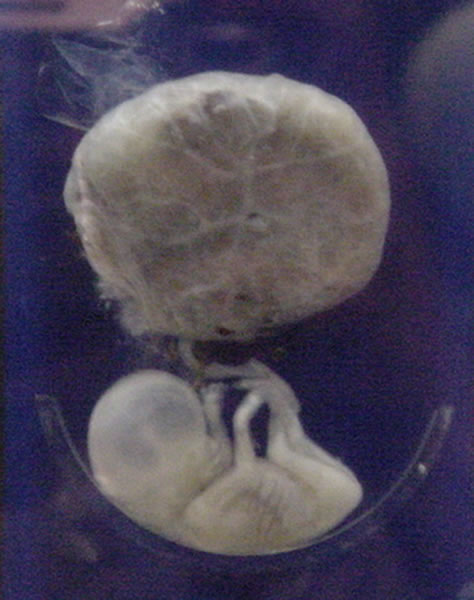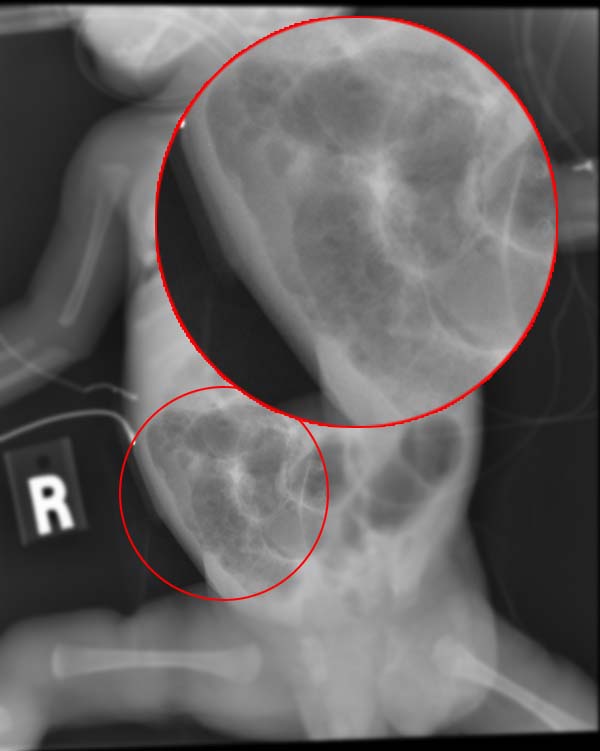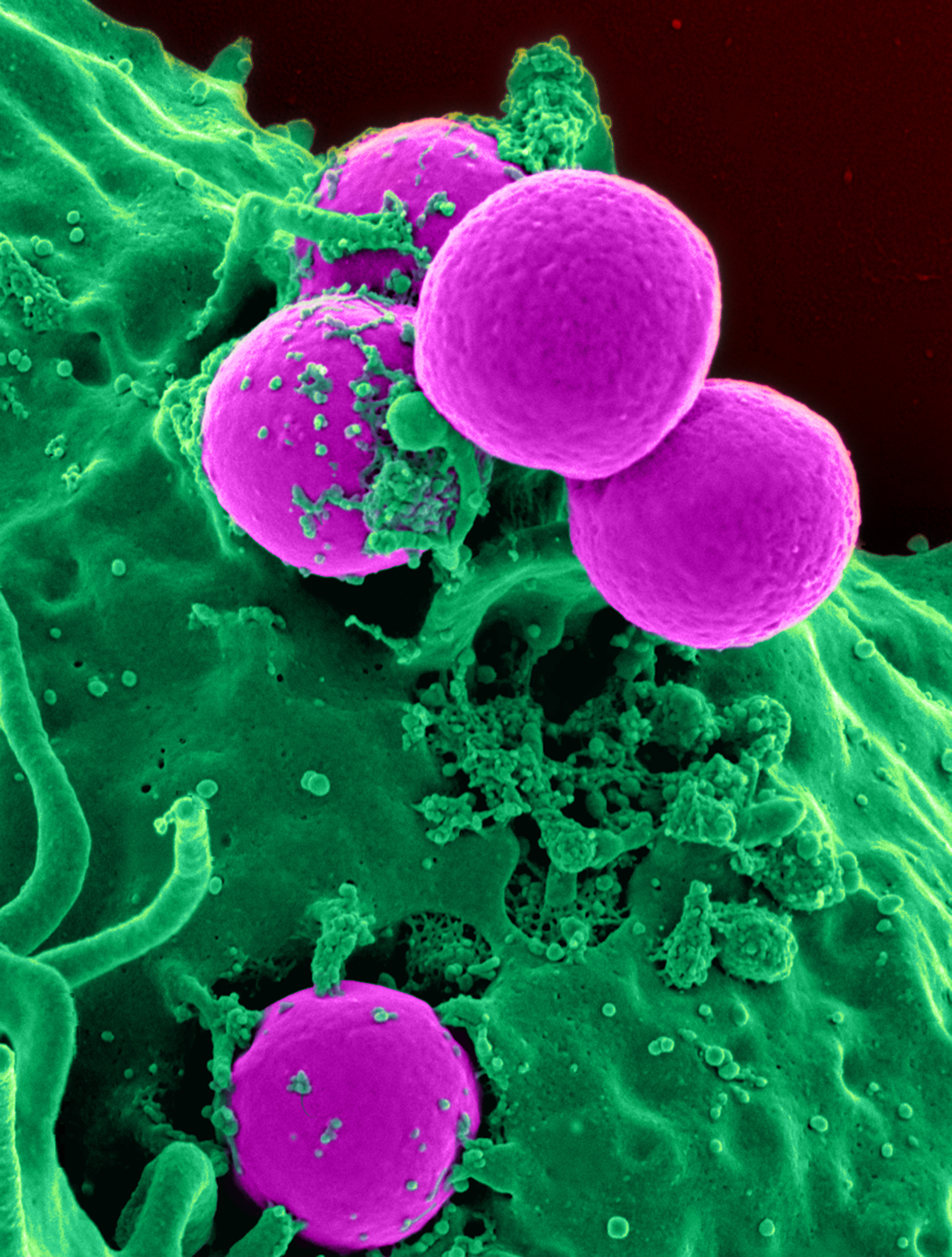|
Premature Rupture Of Membrane
Prelabor rupture of membranes (PROM), previously known as premature rupture of membranes, is breakage of the amniotic sac before the onset of labour. Women usually experience a painless gush or a steady leakage of fluid from the vagina. Complications in the baby may include premature birth, cord compression, and infection. Complications in the mother may include placental abruption and postpartum endometritis. Risk factors include infection of the amniotic fluid, prior PROM, bleeding in the later parts of pregnancy, smoking, and a mother who is underweight. Diagnosis is suspected based on symptoms and speculum exam and may be supported by testing the vaginal fluid or by ultrasound. If it occurs before 37 weeks it is known as PPROM (preterm prelabor rupture of membranes) otherwise it is known as term PROM. Treatment is based on how far along a woman is in pregnancy and whether complications are present. In those at or near term without any complications, induction of lab ... [...More Info...] [...Related Items...] OR: [Wikipedia] [Google] [Baidu] |
Obstetrics
Obstetrics is the field of study concentrated on pregnancy, childbirth and the postpartum period. As a medical specialty, obstetrics is combined with gynecology under the discipline known as obstetrics and gynecology (OB/GYN), which is a surgical field. Main areas Prenatal care Prenatal care is important in screening for various complications of pregnancy. This includes routine office visits with physical exams and routine lab tests along with telehealth care for women with low-risk pregnancies: Image:Ultrasound_image_of_a_fetus.jpg, 3D ultrasound of fetus (about 14 weeks gestational age) Image:Sucking his thumb and waving.jpg, Fetus at 17 weeks Image:3dultrasound 20 weeks.jpg, Fetus at 20 weeks First trimester Routine tests in the first trimester of pregnancy generally include: * Complete blood count * Blood type ** Rh-negative antenatal patients should receive RhoGAM at 28 weeks to prevent Rh disease. * Indirect Coombs test (AGT) to assess risk of hem ... [...More Info...] [...Related Items...] OR: [Wikipedia] [Google] [Baidu] |
Speculum Exam
A pelvic examination is the physical examination of the external and internal female pelvic organs. It is frequently used in gynecology for the evaluation of symptoms affecting the female reproductive and urinary tract, such as pain, bleeding, discharge, urinary incontinence, or trauma (e.g. sexual assault). It can also be used to assess a woman's anatomy in preparation for procedures. The exam can be done awake in the clinic and emergency department, or under anesthesia in the operating room. The most commonly performed components of the exam are 1) the external exam, to evaluate the vulva 2) the internal exam with palpation (commonly called the ''bimanual exam'') to examine the uterus, ovaries, and structures adjacent to the uterus (adnexae) and 3) the internal exam using a speculum to visualize the vaginal walls and cervix. During the pelvic exam, sample of cells and fluids may be collected to screen for sexually transmitted infections or cancer (the Pap test). Some clinician ... [...More Info...] [...Related Items...] OR: [Wikipedia] [Google] [Baidu] |
Urinary Tract Infection
A urinary tract infection (UTI) is an infection that affects a part of the urinary tract. Lower urinary tract infections may involve the bladder (cystitis) or urethra (urethritis) while upper urinary tract infections affect the kidney (pyelonephritis). Symptoms from a lower urinary tract infection include suprapubic pain, painful urination (dysuria), frequency and urgency of urination despite having an empty bladder. Symptoms of a kidney infection, on the other hand, are more systemic and include fever or Abdominal pain, flank pain usually in addition to the symptoms of a lower UTI. Rarely, the urine may appear Hematuria, bloody. Symptoms may be vague or non-specific at the extremities of age (i.e. in patients who are very young or old). The most common cause of infection is ''Escherichia coli'', though other bacteria or fungi may sometimes be the cause. Risk factors include female anatomy, sexual intercourse, diabetes mellitus, diabetes, obesity, catheterisation, and famil ... [...More Info...] [...Related Items...] OR: [Wikipedia] [Google] [Baidu] |
Fetus
A fetus or foetus (; : fetuses, foetuses, rarely feti or foeti) is the unborn offspring of a viviparous animal that develops from an embryo. Following the embryonic development, embryonic stage, the fetal stage of development takes place. Prenatal development is a continuum, with no clear defining feature distinguishing an embryo from a fetus. However, in general a fetus is characterized by the presence of all the major body organs, though they will not yet be fully developed and functional, and some may not yet be situated in their final Anatomy, anatomical location. In human prenatal development, fetal development begins from the ninth week after Human fertilization, fertilization (which is the eleventh week of Gestational age (obstetrics), gestational age) and continues until the childbirth, birth of a newborn. Etymology The word ''wikt:fetus#English, fetus'' (plural ''wikt:fetuses#English, fetuses'' or rarely, the solecism ''wikt:feti#English, feti''''Oxford English Dict ... [...More Info...] [...Related Items...] OR: [Wikipedia] [Google] [Baidu] |
Meconium
Meconium is the earliest stool of a mammalian infant resulting from defecation. Unlike later feces, meconium is composed of materials ingested during the time the infant spends in the uterus: intestinal epithelial cells, lanugo, mucus, amniotic fluid, bile, and water. Meconium, unlike later feces, is viscous and sticky like tar – its color usually being a very dark olive green and it is almost odorless. When diluted in amniotic fluid, it may appear in various shades of green, brown, or yellow. It should be completely passed by the end of the first few days after birth, with the stools progressing toward yellow (digested milk). Clinical significance Meconium in amniotic fluid Meconium is normally retained in the infant's bowel until after birth, but sometimes it is expelled into the amniotic fluid prior to birth or during labor and delivery. The stained amniotic fluid is recognized by medical staff as a possible sign of fetal distress. Some post-dates pregnancies ... [...More Info...] [...Related Items...] OR: [Wikipedia] [Google] [Baidu] |
Uterine Contraction
Uterine contractions are muscle contractions of the uterine smooth muscle that can occur at various intensities in both the non-pregnant and pregnant uterine state. The non-pregnant uterus undergoes small, spontaneous contractions in addition to stronger, coordinated contractions during the menstrual cycle and orgasm. Throughout gestation, the uterus enters a state of uterine quiescence due to various neural and hormonal changes. During this state, the uterus undergoes little to no contractions, though spontaneous contractions still occur for the uterine myocyte cells to experience hypertrophy. The pregnant uterus only contracts strongly during orgasms, labour, and in the postpartum stage to return to its natural size. Throughout menstrual cycle Uterine contractions that occur throughout the menstrual cycle, also termed ''endometrial waves'' or ''contractile waves'', appear to involve only the sub- endometrial layer of the myometrium. Follicular and luteal phase In the early ... [...More Info...] [...Related Items...] OR: [Wikipedia] [Google] [Baidu] |
Cerebral Palsy
Cerebral palsy (CP) is a group of movement disorders that appear in early childhood. Signs and symptoms vary among people and over time, but include poor coordination, spasticity, stiff muscles, Paresis, weak muscles, and tremors. There may be problems with sense, sensation, visual perception, vision, hearing, and speech. Often, babies with cerebral palsy do not roll over, sit, crawl or walk as early as other children. Other symptoms may include seizures and problems with cognition, thinking or reasoning. While symptoms may get more noticeable over the first years of life, underlying problems do not worsen over time. Cerebral palsy is caused by abnormal development or damage to the parts of the brain that control movement, balance, and posture. Most often, the problems occur during pregnancy, but may occur during childbirth or shortly afterwards. Often, the cause is unknown. Risk factors include preterm birth, being a twin, certain infections or exposure to methylmercury duri ... [...More Info...] [...Related Items...] OR: [Wikipedia] [Google] [Baidu] |
Intraventricular Hemorrhage
Intraventricular hemorrhage (IVH), also known as intraventricular bleeding, is a bleeding into the brain's ventricular system, where the cerebrospinal fluid is produced and circulates through towards the subarachnoid space. It can result from physical trauma or from hemorrhagic stroke. 30% of intraventricular hemorrhage (IVH) are primary, confined to the ventricular system and typically caused by intraventricular trauma, aneurysm, vascular malformations, or tumors, particularly of the choroid plexus. However 70% of IVH are secondary in nature, resulting from an expansion of an existing intraparenchymal or subarachnoid hemorrhage. Intraventricular hemorrhage has been found to occur in 35% of moderate to severe traumatic brain injuries. Thus the hemorrhage usually does not occur without extensive associated damage, and so the outcome is rarely good.Dawodu S. 2007"Traumatic Brain Injury: Definition, Epidemiology, Pathophysiology"Emedicine.com. Retrieved on June 19, 2007.Vinas ... [...More Info...] [...Related Items...] OR: [Wikipedia] [Google] [Baidu] |
Necrotizing Enterocolitis
Necrotizing enterocolitis (NEC) is an intestinal disease that affects premature or very low birth weight infants. Symptoms may include poor feeding, bloating, decreased activity, blood in the stool, vomiting of bile, multi-organ failure, and potentially death. The exact cause is unclear. However, several risk factors have been identified. Consistently described risk factors include formula feeding, intestinal dysbiosis, low birth weight, and prematurity. Other risk factors potentially implicated include congenital heart disease, birth asphyxia, exchange transfusion, and prelabor rupture of membranes. The underlying mechanism is believed to involve a combination of poor blood flow and infection of the intestines. Diagnosis is based on symptoms and confirmed with medical imaging. Maternal factors such as chorioamnionitis, cocaine abuse, intrauterine growth restriction, intrahepatic cholestasis during pregnancy, increased body mass index, lack of prenatal steroids, m ... [...More Info...] [...Related Items...] OR: [Wikipedia] [Google] [Baidu] |
Preterm Birth
Preterm birth, also known as premature birth, is the Childbirth, birth of a baby at fewer than 37 weeks Gestational age (obstetrics), gestational age, as opposed to full-term delivery at approximately 40 weeks. Extreme preterm is less than 28 weeks, very early preterm birth is between 28 and 32 weeks, early preterm birth occurs between 32 and 34 weeks, Late preterm infant, late preterm birth is between 34 and 36 weeks' gestation. These babies are also known as premature babies or colloquially preemies (American English) or premmies (Australian English). Symptoms of preterm labor include uterine contractions which occur more often than every ten minutes and/or the leaking of fluid from the vagina before 37 weeks. Premature infants are at greater risk for cerebral palsy, delays in development, hearing problems and problems with their Visual impairment, vision. The earlier a baby is born, the greater these risks will be. The cause of spontaneous preterm birth is often not known. R ... [...More Info...] [...Related Items...] OR: [Wikipedia] [Google] [Baidu] |
Group B Streptococcus
''Streptococcus agalactiae'' (also known as group B streptococcus or GBS) is a gram-positive bacteria, gram-positive coccus (round bacteria, bacterium) with a tendency to form chains (as reflected by the genus name ''Streptococcus''). It is a beta-hemolysis, hemolytic, catalase-negative, and facultative anaerobe. ''S. agalactiae'' is the most common human pathogen of streptococci belonging to group B of the Rebecca Lancefield classification of streptococci. GBS are surrounded by a bacterial capsule composed of polysaccharides (exopolysaccharide). The species is subclassified into ten serotypes (Ia, Ib, II–IX) depending on the immunologic reactivity of their polysaccharide capsule. The plural term group B streptococci (referring to the serotypes) and the singular term group B streptococcus (referring to the single species) are both commonly used synonymously with ''S. agalactiae'' even though ''Streptococcus halichoeri, S. halichoeri'' and ''Streptococcus pseudoporcinus, S. pseu ... [...More Info...] [...Related Items...] OR: [Wikipedia] [Google] [Baidu] |
Antibiotics
An antibiotic is a type of antimicrobial substance active against bacteria. It is the most important type of antibacterial agent for fighting pathogenic bacteria, bacterial infections, and antibiotic medications are widely used in the therapy, treatment and antibiotic prophylaxis, prevention of such infections. They may either bactericide, kill or bacteriostatic agent, inhibit the growth of bacteria. A limited number of antibiotics also possess antiprotozoal activity. Antibiotics are not effective against viruses such as the ones which cause the common cold or influenza. Drugs which inhibit growth of viruses are termed antiviral drugs or antivirals. Antibiotics are also not effective against fungi. Drugs which inhibit growth of fungi are called antifungal drugs. Sometimes, the term ''antibiotic''—literally "opposing life", from the Greek language, Greek roots ἀντι ''anti'', "against" and βίος ''bios'', "life"—is broadly used to refer to any substance used against ... [...More Info...] [...Related Items...] OR: [Wikipedia] [Google] [Baidu] |








